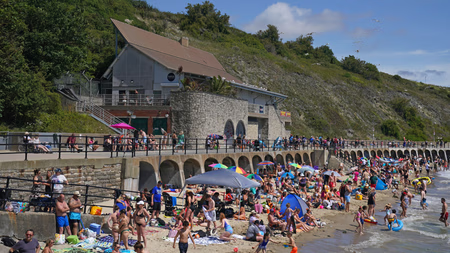Wildfire in Surrey as Heatwave Pushes Scotland to 32.2°C
The UK is grappling with its third heatwave of 2025, with temperatures soaring to 32.2°C in Scotland’s Highlands, marking the country’s hottest day of the year so far, while a wildfire in Surrey has heightened concerns about the impacts of extreme heat. The Met Office reported that Aviemore in the Scottish Highlands reached 32.2°C on Saturday, surpassing previous 2025 records, while Northern Ireland and Wales also recorded their warmest days, with 29.2°C in Magilligan and 33.1°C in Bute Park, respectively. The intense heat has triggered widespread disruption, including a raging wildfire in Surrey, train cancellations, and hosepipe bans affecting over seven million people.
In Surrey, a wildfire broke out near Woking on Friday, fueled by dry conditions and high temperatures, with flames spreading rapidly across heathland. The Surrey Fire and Rescue Service deployed 10 fire engines and 70 firefighters to contain the blaze, which has scorched an estimated 20 hectares. “The dry vegetation and extreme heat make these fires particularly dangerous,” said a spokesperson, urging the public to avoid open flames and dispose of cigarettes responsibly. The fire, visible from the M25 motorway, has caused road closures and air quality warnings, with smoke plumes affecting nearby communities. Posts on X captured public concern, with @SurreyLive noting, “Woking wildfire out of control, stay safe everyone.”
Scotland’s record-breaking heat, with 32.2°C in Aviemore, has intensified wildfire risks across the region, with the Scottish Fire and Rescue Service (SFRS) issuing an “extreme” warning for central and eastern areas through Monday. A separate wildfire in Perth, ongoing since Friday, has seen flames creeping up hillsides, prompting SFRS to urge caution with barbecues and glass objects that could spark fires. Leigh Hamilton, a ranger at Loch Lomond National Park, emphasized, “A single spark can ignite a devastating blaze in these conditions.”
The heatwave, driven by a high-pressure system, has also disrupted transport and events. In Wales, rail services were canceled after heat damaged tracks, stranding thousands, including fans heading to a Stereophonics concert in Cardiff, with one X user, @WalesOnline, describing the scene as “chaos at Aberdare station.” Sporting events, including the Snowdon24 race in Eryri National Park, were halted due to “extreme temperatures,” with organizers safely escorting runners off the mountain. Wimbledon’s Women’s Final, where Iga Swiatek defeated Amanda Anisimova, saw temperatures hit 31°C, close to the 1976 record of 31.2°C.
Amber heat health alerts remain in place across southern England, the Midlands, and East Anglia until Monday, warning of risks to the entire population, particularly the elderly and those with health conditions. The UK Health Security Agency reported strain on NHS services, with urgent care doctor Lorna Powell noting increased risks for vulnerable groups. Hosepipe bans in Yorkshire, Kent, and Sussex have sparked debate, with @BBCNews reporting public frustration over water restrictions amid record demand.
The Met Office attributes the heatwave’s intensity to climate change, with scientists noting that such extreme temperatures—once rare—are now 100 times more likely than in pre-industrial times. “These heatwaves are longer, hotter, and more frequent due to human-induced warming,” said Ben Clarke of Imperial College London. Relief is expected on Monday as cooler Atlantic air brings temperatures down to the mid-20s, with potential showers in eastern England. Until then, the UK remains on high alert, with authorities urging vigilance to prevent further fires and health risks.
